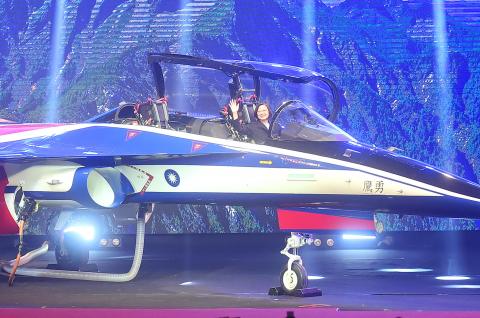President Tsai Ing-wen (蔡英文) yesterday attended the rollout of the first indigenously produced Advanced Jet Trainer at the Aerospace Industrial Development Corp (AIDC, 漢翔航空) factory in Taichung’s Salu District (沙鹿)
The manufacture of the prototype, which the Ministry of National Defense named the AIDC T-5 Yung Ying (勇鷹, “Brave Eagle”), marks a historic milestone for the air force, the nation’s aerospace industry and the administration’s pledge to create a self-sufficient defense industry, Tsai said.
“There have been many challenges, detractors, critics and naysayers on the long journey leading to this day, but the facts show that we were right and our efforts were not in vain,” she said before thanking the ministry, the AIDC and the Chungshan Institute of Science and Technology.

Photo: Liao Yao-tung, Taipei Times
Tsai said that the idea for the indigenous trainer came from a discussion in 2016 with then-AIDC chairman Feng Shih-kuan (馮世寬) when she was campaigning as the Democratic Progressive Party’s (DPP) presidential candidate.
Feng had told her that the AIDC had tried and failed to convince the then-Chinese Nationalist Party (KMT) government to develop a military jet, and that this would have grave consequences for industry in Taiwan, she said.
After becoming president, she made it a priority of her administration to support the design and manufacture of an advanced jet trainer, which also served to revive the aerospace industry, she said.
Since 2017, the trainer program has spent NT$37.7 billion (US$1.22 billion at the current exchange rate) on Taiwanese enterprises, or more than half of its NT$68.6 billion budget, and created 1,200 jobs, she said, adding that the program would create another 800 jobs by 2021.
In response to requests for comment, Institute of National Defense and Security Research senior analyst Su Tzu-yun (蘇紫雲) said that the Advanced Jet Trainer has a dual-purpose platform — both flight and tactical training — which increases air force efficiency and streamlines logistics.
The air force uses the Beechcraft T-34 for basic flight training, the AIDC AT-3 for intermediate flight training and the Northrop F-5 for advanced tactical training, he said.
The Advanced Jet Trainer would replace the AT-3 and the F-5, which the air force plans to retire, he said, adding that having a common platform for flight and tactical training would facilitate training and reduce operating costs.
The Yung Ying and the AIDC’s Indigenous Defense Fighter have interchangeable parts, so mass-producing the Advanced Jet Trainer would increase the supply of spare parts for both, he said, adding that the jets use a Honeywell/ITEC F124 engine, which is 55 percent domestically produced.
While information about the Advanced Jet Trainer’s avionics have not been made public, the jet is believed to have a glass cockpit that allows different flight characteristics to be simulated via augmented reality technology, he said.
The trainer prototype was dubbed the XAT-5, suggesting that the Advanced Jet Trainer is capable of bombing or launching missiles at ground troops, motor vehicles and ships, he said.
Producing armaments domestically is considered to increase the value of the allocations by a factor of 2.5, meaning that the trainer program should add NT$150 billion to the economy, he added.
Additional reporting by CNA

MAKING WAVES: China’s maritime militia could become a nontraditional threat in war, clogging up shipping lanes to prevent US or Japanese intervention, a report said About 1,900 Chinese ships flying flags of convenience and fishing vessels that participated in China’s military exercises around Taiwan last month and in January have been listed for monitoring, Coast Guard Administration (CGA) Deputy Director-General Hsieh Ching-chin (謝慶欽) said yesterday. Following amendments to the Commercial Port Act (商港法) and the Law of Ships (船舶法) last month, the CGA can designate possible berthing areas or deny ports of call for vessels suspected of loitering around areas where undersea cables can be accessed, Oceans Affairs Council Minister Kuan Bi-ling (管碧玲) said. The list of suspected ships, originally 300, had risen to about 1,900 as

Japan’s strategic alliance with the US would collapse if Tokyo were to turn away from a conflict in Taiwan, Japanese Prime Minister Sanae Takaichi said yesterday, but distanced herself from previous comments that suggested a possible military response in such an event. Takaichi expressed her latest views on a nationally broadcast TV program late on Monday, where an opposition party leader criticized her for igniting tensions with China with the earlier remarks. Ties between Japan and China have sunk to the worst level in years after Takaichi said in November that a hypothetical Chinese attack on Taiwan could bring about a Japanese

Right-wing political scientist Laura Fernandez on Sunday won Costa Rica’s presidential election by a landslide, after promising to crack down on rising violence linked to the cocaine trade. Fernandez’s nearest rival, economist Alvaro Ramos, conceded defeat as results showed the ruling party far exceeding the threshold of 40 percent needed to avoid a runoff. With 94 percent of polling stations counted, the political heir of outgoing Costa Rican President Rodrigo Chaves had captured 48.3 percent of the vote compared with Ramos’ 33.4 percent, the Supreme Electoral Tribunal said. As soon as the first results were announced, members of Fernandez’s Sovereign People’s Party

MORE RESPONSIBILITY: Draftees would be expected to fight alongside professional soldiers, likely requiring the transformation of some training brigades into combat units The armed forces are to start incorporating new conscripts into combined arms brigades this year to enhance combat readiness, the Executive Yuan’s latest policy report said. The new policy would affect Taiwanese men entering the military for their compulsory service, which was extended to one year under reforms by then-president Tsai Ing-wen (蔡英文) in 2022. The conscripts would be trained to operate machine guns, uncrewed aerial vehicles, anti-tank guided missile launchers and Stinger air defense systems, the report said, adding that the basic training would be lengthened to eight weeks. After basic training, conscripts would be sorted into infantry battalions that would take